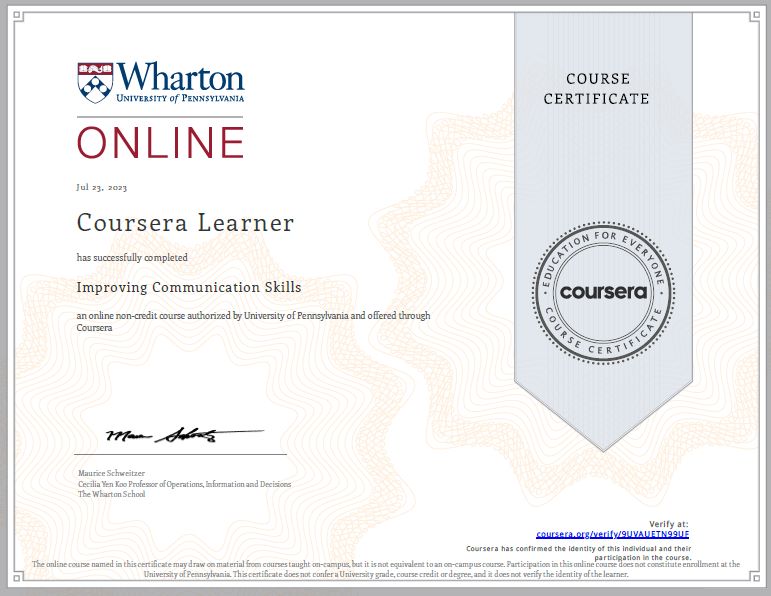Two months ago, I applied for the course “Improving Communication Skills” offered by the University of Pennsylvania’s Wharton School on Coursera. This comprehensive and practical program is designed to enhance participants’ communication abilities in both personal and professional settings.
I was particularly interested in the course because it covers a wide range of topics essential for effective communication. It taught me how to articulate my thoughts clearly, actively listen to others, and convey ideas with impact. The course delved into various communication methods, including verbal and non-verbal communication, helping me become more confident and influential in my speaking.
The instructors, who are experts in communication and business, provided valuable insights and feedback to help refine participants’ communication styles. As a result, I gained the ability to engage and persuade audiences effectively, whether in a boardroom presentation, team meeting, or casual conversation.
For anyone seeking to become a more confident and persuasive communicator, the “Improving Communication Skills” course from the Wharton School is an excellent choice. Its engaging content, practical exercises, and expert instruction make it a transformative learning experience that can elevate communication skills to new heights.
The main elements of communication covered in the “Improving Communication Skills” course offered by the University of Pennsylvania’s Wharton School include:
- Clarity and Articulation: Emphasizing the importance of expressing ideas clearly and concisely to ensure the intended message is understood by the audience.
- Active Listening: Teaching participants the significance of attentive listening and understanding the perspectives of others to foster effective communication and build rapport.
- Verbal and Non-Verbal Communication: Exploring both verbal (spoken words) and non-verbal (body language, facial expressions) aspects of communication and their impact on the overall message conveyed.
- Influential Presentation: Equipping learners with the skills to deliver impactful presentations that engage and persuade the audience effectively.
- Emotional Intelligence: Recognizing the role of emotional intelligence in communication and how empathy and understanding can enhance connections with others.
- Adaptability and Flexibility: Encouraging learners to adapt their communication style to suit different audiences and situations.
- Feedback and Improvement: Providing opportunities for receiving feedback and incorporating it to continuously improve communication skills.
- Confidence Building: Empowering participants to overcome communication barriers and build self-confidence in their ability to communicate effectively.
- Building Rapport and Connection: Fostering skills for building strong connections and rapport with others, creating a positive communication environment.
- Cultural Sensitivity: Highlighting the importance of cultural awareness and sensitivity in cross-cultural communication.
By addressing these key elements, the course helps participants develop a well-rounded and comprehensive understanding of effective communication, empowering them to excel in various personal and professional interactions.
